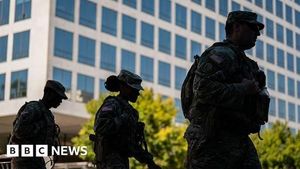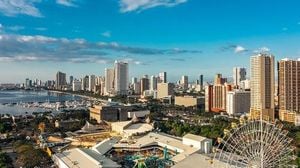The recent closure of the Tyson pork plant in Perry, Iowa, has thrown the small town's economy and workforce for a loop. With 25% of the locals employed at this facility, the impacts are deeply felt throughout the community.
Joe Swanson, one of the affected residents, recalls the day the announcement was made back in March. Faced with personal health concerns, he secured another job with benefits before the plant officially closed its doors on June 28.
Swanson worked at the Tyson plant for 14 years, and he expresses both regret and concern for his coworkers. "None of us picked this, and I just want everybody to be OK," he said, capturing the anxiety of workers facing sudden unemployment.
Alongside Swanson, nearly 1,300 employees are now faced with the grim reality of living without work. For many, finding the right job opportunities becomes increasingly challenging as they try to navigate their new situation.
The town of Perry is grappling with the loss; the plant provided jobs for about 25% of the working-age residents. The ripple effects mean about 60% of Perry's population directly feels the sting of this closure when considering families and businesses tied to the plant.
Tyson Foods confirmed earlier this year two hundred of the displaced workers have found employment at other Tyson locations either within Iowa or out of state. This is only a temporary salve for what remains a hard hit to the local economy.
Researchers point out this situation is not unique to Perry. Towns across America have experienced similar downturns when reliant on singular industries, often referred to as "one-factory" towns.
The plight of these towns has historical precedence. For example, Youngstown, Ohio, once had thriving steel mills; today, its population is less than half of what it was due to massive job losses.
Perry draws on lessons from such histories as residents like Nacho Calderon begin to rethink their career paths. After losing his job at Tyson, he’s contemplating training to drive garbage or concrete trucks, both lucrative options.
Community support is also coming through educational programs, with local colleges offering free CDL training to help workers pivot skills and find employment. This initiative aims to help residents stay connected to their hometown rather than being forced to seek jobs elsewhere.
Calderon shares his sorrow for his former colleagues who are struggling without reliable transportation or enough savings to tide them over. With many workers facing similar circumstances, the community's response becomes critical.
Meanwhile, Swanson, who has transitioned to maintenance work at another apartment complex, encourages others to take control of their careers. "Take control," he urges. It's about seizing new opportunities where they arise.
Despite the challenges, there’s hope for the Perry community. Residents are determined to bounce back and refuse to let the closure be the end of their livelihoods.
The shutdown of the Tyson Foods plant is emblematic of larger trends affecting similar towns across the country, where factory closures result not just in job losses but weaken community ties and economic stability. Looking back at previous downturns, it’s evident recovery requires resilience and innovation.
Strategies for rebuilding might include diversifying the local economy and attracting new businesses to replace the jobs lost. Local leaders recognize this can be challenging but see it as necessary for their town’s future.
Rachel Wacker, executive director of the Greater Dallas County Development Alliance, reflects on the unlikelihood of immediate relief. She shared hopes for fresh opportunities, admitting it’s not simple to instantly solve the challenges presented.
The community’s recovery will hinge on local leaders' capacity to advocate for alternative employment routes and vocational training programs. Engaging residents and potential employers might be the key to revitalizing Perry's economy.
Through solidarity and innovative responses, Perry has the potential to transform this setback. While the road to recovery will be difficult, the determination to find new avenues of work continues to thrive.
For now, Perry residents are supporting one another and exploring all avenues for economic survival. Amid the uncertainty, they share resources and stay hopeful, just as they always have.



